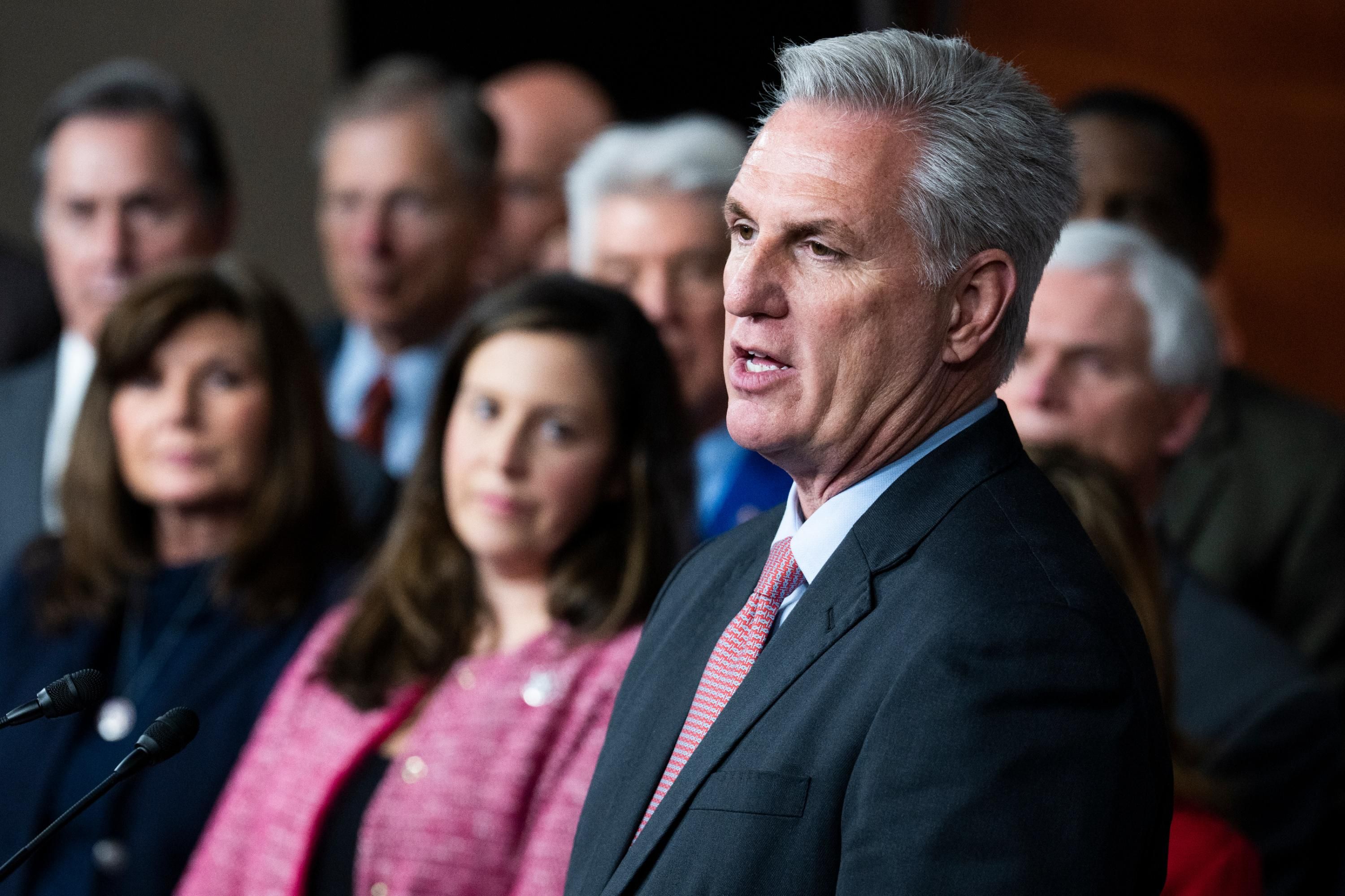The Republican leader claimed that organized staffers would not be "productive for the government."

House Minority Leader Kevin McCarthy (R-Calif.) speaks at a news
\ conference on January 20, 2022.
(Photo: Tom Williams/CQ-Roll Call, Inc. via Getty Images)
JAKE JOHNSON
JAKE JOHNSON
COMMON DREAMS
February 8, 2022
The sincerity of the GOP's attempt to rebrand as a party of workers was called into further question Monday when Rep. Kevin McCarthy—the Republican leader in the U.S. House—spoke out against congressional staffers' nascent unionization push, which has won the enthusiastic support of progressive lawmakers and Democratic leaders.
"I don't think it would be productive for the government," McCarthy (R-Calif.), a top ally of former President Donald Trump, told Punchbowl News of the unionization effort by Capitol Hill aides, many of whom are paid annual salaries in the low $20,000 range and struggle to afford basic necessities in one of the nation's most expensive cities.
McCarthy's anti-union comments came almost exactly a year after he told Punchbowl that the current GOP is "the American workers' party"—even as more than 100 members of his caucus pushed legislation that would undermine union rights nationwide.
Following McCarthy's latest remarks, observers were quick to highlight the disconnect between the GOP's pre-midterm branding exercise and its actual policy positions, which overwhelmingly favor the wealthy and corporate interests.
"The Republican Party is the party of union busters," tweeted the progressive advocacy group People for Bernie.
In contrast to McCarthy, House Speaker Nancy Pelosi (D-Calif.) and Senate Majority Leader Chuck Schumer (D-N.Y.) both endorsed congressional staffers' collective bargaining push, which was officially launched last week by a group dubbed the Congressional Workers Union.
"Like all Americans, our tireless congressional staff have the right to organize their workplace and join together in a union," Pelosi spokesperson Drew Hammill said in a statement. "If and when staffers choose to exercise that right, they would have Speaker Pelosi's full support."
To move forward, as Insider's Kayla Epstein explains, the organizing effort would require both the U.S. House and Senate to pass resolutions allowing congressional office and committee staffers to unionize.
Rep. Andy Levin (D-Mich.), a member of the Congressional Progressive Caucus, announced Friday that the House would soon "take legislative action to afford congressional staff the freedom to form a union—a fundamental right of all workers." Sen. Sherrod Brown (D-Ohio) is planning to introduce a companion measure in the upper chamber.
In a statement Monday, the Congressional Workers Union applauded the House resolution that is reportedly circulating among lawmakers and urged "each and every member of Congress—especially those who have publicly expressed support for congressional staff unionization efforts—to sign on."
"To better serve the public and improve working conditions here in Congress, congressional staff must have the protections to organize for a better workplace," the group said. "According to Demand Progress' tracker, at least 73 members of Congress express support for staff unionization efforts—but that is not enough. We call on every member of the House to sign and for House leadership to bring this concrete action to the floor for a vote."
The sincerity of the GOP's attempt to rebrand as a party of workers was called into further question Monday when Rep. Kevin McCarthy—the Republican leader in the U.S. House—spoke out against congressional staffers' nascent unionization push, which has won the enthusiastic support of progressive lawmakers and Democratic leaders.
"I don't think it would be productive for the government," McCarthy (R-Calif.), a top ally of former President Donald Trump, told Punchbowl News of the unionization effort by Capitol Hill aides, many of whom are paid annual salaries in the low $20,000 range and struggle to afford basic necessities in one of the nation's most expensive cities.
McCarthy's anti-union comments came almost exactly a year after he told Punchbowl that the current GOP is "the American workers' party"—even as more than 100 members of his caucus pushed legislation that would undermine union rights nationwide.
Following McCarthy's latest remarks, observers were quick to highlight the disconnect between the GOP's pre-midterm branding exercise and its actual policy positions, which overwhelmingly favor the wealthy and corporate interests.
"The Republican Party is the party of union busters," tweeted the progressive advocacy group People for Bernie.
In contrast to McCarthy, House Speaker Nancy Pelosi (D-Calif.) and Senate Majority Leader Chuck Schumer (D-N.Y.) both endorsed congressional staffers' collective bargaining push, which was officially launched last week by a group dubbed the Congressional Workers Union.
"Like all Americans, our tireless congressional staff have the right to organize their workplace and join together in a union," Pelosi spokesperson Drew Hammill said in a statement. "If and when staffers choose to exercise that right, they would have Speaker Pelosi's full support."
To move forward, as Insider's Kayla Epstein explains, the organizing effort would require both the U.S. House and Senate to pass resolutions allowing congressional office and committee staffers to unionize.
Rep. Andy Levin (D-Mich.), a member of the Congressional Progressive Caucus, announced Friday that the House would soon "take legislative action to afford congressional staff the freedom to form a union—a fundamental right of all workers." Sen. Sherrod Brown (D-Ohio) is planning to introduce a companion measure in the upper chamber.
In a statement Monday, the Congressional Workers Union applauded the House resolution that is reportedly circulating among lawmakers and urged "each and every member of Congress—especially those who have publicly expressed support for congressional staff unionization efforts—to sign on."
"To better serve the public and improve working conditions here in Congress, congressional staff must have the protections to organize for a better workplace," the group said. "According to Demand Progress' tracker, at least 73 members of Congress express support for staff unionization efforts—but that is not enough. We call on every member of the House to sign and for House leadership to bring this concrete action to the floor for a vote."
Our work is licensed under Creative Commons (CC BY-NC-ND 3.0). Feel free to republish and share widely.
No comments:
Post a Comment